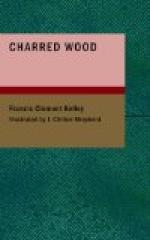“Not even a little of the ‘blessed drop.’ I am really not English, though born in England. Both father and mother were Scotch. So I am kin to the ‘blessed drop.’”
“And you drifted here—”
“Not exactly ‘drifted,’ Mark. I came because I wanted to come. I came for opportunity. I was ambitious, and then there was another reason—but that is at present forbidden ground. Here is your constable friend again.”
The constable passed with a respectful touch of his helmet. He at least was of the soil. Every line of his face spoke of New England.
“He is a character worth studying,” remarked Father Murray. “Have you ever talked with him?”
“No. I have had no chance.”
“Then find one, and put him in a book. He was once rich for Sihasset. That was in the lumber days. But he lost his money, and he thinks that the town owes him a living. That is the Methodist minister to whom he is speaking now. He, too, is worth your attention.”
“Do you get along well with the Protestant clergy of the town?” asked Mark.
“Splendidly,” said Father Murray; “especially with the Universalist. There is a lot of humor in the Universalist. I suspect the ’blessed drop’ in him. One day I happened to call him a Unitarian, and he corrected me. ‘But what,’ I asked, ’is the difference between the Universalists and the Unitarians?’ The little man smiled and said: ’One of my professors put it like this: “The Unitarians believe that God is too good to damn them, and the Universalists believe they are too good to be damned."’”
“Still, it cannot be an easy life,” said Mark, “to be one of seven or eight Protestant pastors in such a small town.”
“It certainly is hard sledding,” replied Father Murray. “But these men take it very philosophically and with a great deal of self-effacement. The country clergyman has trials that his city brother knows nothing about. He has to figure on the pennies that rarely grow to dollars.”
The two friends walked on, Mark’s mind reverting to his own lack of faith and contrasting his dubiety with the sincerity of men who firmly believe—foremost among them the man who walked by his side. Ah, if he, too, could only know! He broke the silence.
“Father.” He spoke hurriedly, as if fearing he might not have courage to continue what he had so boldly begun. “Father, I can’t forget your words regarding those who claim to have studied religion and yet who deliberately leave out of the reckoning the greatest part of religion. I believe I did that very thing. I was once a believer, at least so I thought. I let my belief get away from me; it seemed no longer to merit consideration. I thought I had studied and discarded it; I see now that I simply cast it away. Afterwards, I gave consideration to other religions, but they were cold, lacking in the higher appeal. I turned at last to Theosophy, to Confucianism, but remained always unsatisfied. I never thought to look again into the religion I had inherited.”




